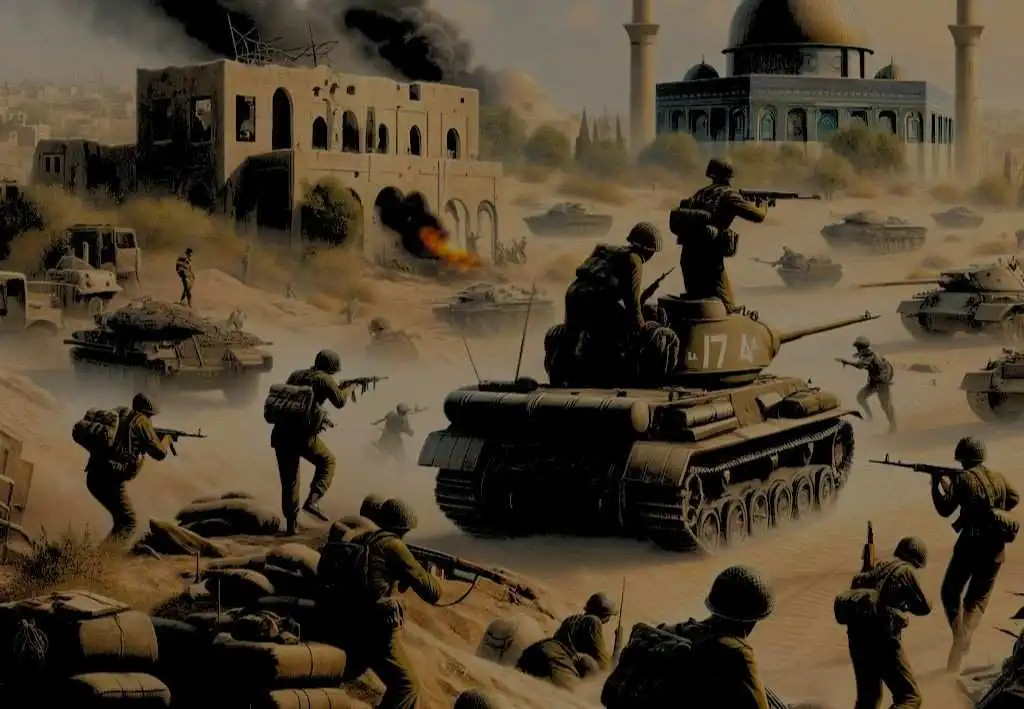On this day, during the Six-Day War, the nation of Israel was tested as it fought for its survival against a coalition of its neighbors. These Arab countries sought to prevent the formal creation of a Jewish state in the region. Rather than accept this threat, the Israelis bravely resisted for almost a week and stunned the world by overpowering this coalition and claiming victory in what became called the Six-Day War.
Preemptive Strike
The Six-Day War, also known as the June War or the 1967 Arab-Israeli War, was a brief yet transformative conflict fought from June 5 to June 10, 1967, between Israel and the neighboring Arab states of Egypt (then the United Arab Republic), Jordan, and Syria.
The Six-day War Background and Causes

For many years, Israel found itself at odds with its neighbors, who refused to acknowledge the legitimacy of its existence, believing that the region should belong to them. This belief led to a series of wars and skirmishes fought intermittently over the previous decades. The origins of the Six-Day War lay in longstanding tensions and hostilities that had been simmering since the Suez Crisis of 1956, a conflict that had already heightened regional instability and animosity.
Following the Suez Crisis, a series of skirmishes and minor conflicts erupted between Israel, Egypt, and Palestinian forces throughout the 1960s. The situation was exacerbated in the months leading up to the war when Egypt began massing troops in the Sinai Peninsula, closed the Straits of Tiran to Israeli shipping, and formed a military alliance with Jordan and Syria. The closure of the Straits of Tiran, a vital maritime route for Israel, was particularly provocative, leading Israel to believe that the Six-day war was imminent.
On June 5, 1967, Israel, anticipating an imminent invasion by the Arab coalition, launched a preemptive airstrike, codenamed Operation Focus, targeting Egyptian airfields. This surprise attack was highly successful, resulting in the destruction of the majority of the Egyptian Air Force while it was still on the ground. The Israeli Air Force’s achievement of air superiority was a crucial turning point in the conflict.
Rapid Advances on Multiple Fronts
With control of the skies, Israeli forces rapidly advanced on multiple fronts. In the Sinai Peninsula, Israeli troops swiftly moved westward, overcoming Egyptian defenses and eventually reaching the Suez Canal. In the Gaza Strip, intense fighting ensued, but Israeli forces managed to secure the area.
On the eastern front, Israel engaged Jordanian forces in the West Bank. Despite fierce resistance, Israeli troops captured key cities, including East Jerusalem, a city of profound religious and historical significance. The capture of East Jerusalem allowed Israel to reunite the city under its control, a momentous event for many Israelis.
To the north, Israel faced Syrian forces entrenched in the fortified Golan Heights. Despite the difficult terrain and strong Syrian defenses, Israeli troops managed to capture the Golan Heights, securing a strategic advantage that overlooked northern Israel.
Aftermath and Legacy
In less than a week, the Six-day war concluded with a decisive Israeli victory. The conflict significantly altered the geopolitical landscape of the Middle East. Israel expanded its territory, capturing the Sinai Peninsula, Gaza Strip, West Bank, East Jerusalem, and the Golan Heights. While this territorial expansion was initially seen as a significant victory, it also laid the groundwork for complex issues related to population displacement and territorial disputes that persist to this day, particularly the ongoing Israeli-Palestinian conflict.
The war’s aftermath saw significant international diplomatic activity. The United Nations Security Council passed Resolution 242, calling for the withdrawal of Israeli forces from occupied territories and the recognition of every state’s right to live in peace within secure and recognized boundaries. This resolution became a cornerstone for subsequent peace negotiations.
Reflections on the Conflict
The Six-Day War remains a pivotal event in Middle Eastern history, shaping the region’s political dynamics for decades to come.
Shortly after the war, US President Lyndon Johnson commented on the swift and decisive nature of the conflict, acknowledging the remarkable military achievement of Israel and emphasizing the need for lasting peace in the region.
“If a single act of folly was more responsible for this explosion than any other, it was the arbitrary and dangerous announced decision that the Straits of Tiran would be closed. The right of innocent, maritime passage must be preserved for all nations.”
Lyndon B. Johnson, Former US President.

A Vintage Tribute
To celebrate this historic victory and reflect on the resilience and determination of those who fought, why not create a vintage letter through our Vintage Letter platform? Our service allows you to craft old-fashioned, beautifully designed letters that capture the essence of a bygone era. If you are curious about this unique way to commemorate history, you can try experimenting with it here.
